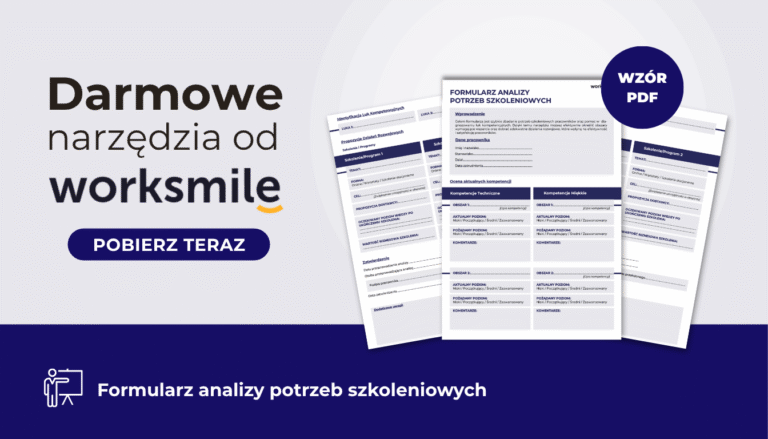In light of the dynamic changes in the technology industry and the growing demand for employee skills development, Worksmile is pleased to present a comprehensive training needs analysis form, which can be downloaded free of charge. This tool is designed to help organizations identify areas requiring training and tailor development programs to the needs of employees in a hybrid mode. Thanks to our proposal, every company will gain clarity and a structured approach to the training process, which in turn translates into increased engagement and organizational effectiveness.
The Worksmile training needs analysis form has been developed based on the latest trends and practices in human resource management, with the aim of providing an effective tool that meets the current requirements of the labor market. With this approach, employers can more easily identify skill gaps in their teams and make informed decisions about investing in competency development. Join us and become part of a customer-focused organization that invests in the responsibility, innovation, and engagement of its employees.
Training Needs Analysis Form: Importance in the Company
Training needs analysis is a key step in effective talent management in any organization. The goal of this process is to determine what skills and competencies should be developed to meet the needs of both employees and the organization itself. In complex work environments, such as those found in modern technology companies, understanding competency gaps is not only beneficial but essential to ensuring sustainable competitiveness. Training needs analysis is important not only for the development of the company but also for the development of the business and the people working in the organization.
Through in-depth analysis, an organization is able to respond to changing market conditions, adapt its employee development strategies, and increase team engagement. A professional training needs analysis form helps to systematize this process, which translates into more effective workshops, programs, and other forms of development. This form has great practical value for business, is tailored to the individual needs of the organization, and supports the professional development of employees, helping them to better prepare for market challenges. It is useful for various groups of customers who want to develop their skills in a flexible form and at a time convenient for them. Training can be conducted at any time and in any form, which increases its accessibility and comfort for participants. From the employees’ perspective, training tailored to their needs leads to greater job satisfaction and a willingness to stay with the organization for longer.
Introduction to training needs analysis
Training needs analysis is the foundation for effective professional development of employees and building a modern training strategy in every company. It allows for the precise identification of competency gaps and the establishment of training priorities, which enables the optimal use of available resources and increases the effectiveness of development activities. You can choose the course that best suits your needs, and some courses offer additional support or certificates. Modern educational platforms offer a wide selection of online courses that allow employees to develop in their chosen areas, according to their individual needs and preferences. In each course, you can learn at your own pace. This approach not only supports the development of competencies, but also motivates employees to seek knowledge independently and invest in themselves, which translates into better results for the entire organization.
The need for self-improvement in the workplace
The modern work environment requires employees to continuously develop and improve their qualifications. The need for self-improvement is becoming a key element in building competitive advantage for both individuals and entire teams. Thanks to online courses available on a modern educational platform, every employee can develop their skills at a time and pace that suits them, adapting their learning to their individual needs and the specific nature of their work.
The complete professionalism of the lecturers and the wide range of training courses mean that participants have access to up-to-date knowledge and practical skills that directly translate into efficiency in their daily duties. Self-improvement is not only an opportunity to gain new qualifications, but also a way to increase job satisfaction and self-esteem. Thanks to online training, employees can develop in areas of their choice, which has a positive impact on their motivation and commitment to achieving business goals.
Methods of training needs analysis
Various methods can be used in the training needs analysis process, such as surveys, interviews, observations, and data analysis. Each of these techniques provides valuable information about employees’ expectations and requirements regarding training. The information gathered is crucial for preparing a practical training offer that meets the real needs of participants and the organization. In the era of digitalization, online tools are increasingly being used to quickly and conveniently collect opinions and analyze results.
The choice of the appropriate method depends on the specific nature of the organization, available resources, and the goal we want to achieve. These methods are understandable to all participants and tailored to the specific nature of the organization, which ensures the effectiveness of the analysis process.
Regardless of the form chosen, it is crucial to maintain complete professionalism at every stage – from preparing questions, through conducting the survey, to interpreting the results. A high level of professionalism and the high standard of services provided by the organization guarantee that the analysis process runs smoothly and efficiently. Only then will the data obtained be reliable and become a solid basis for further development activities in the field of online and traditional training. Training needs analysis supports the development of the organization by providing practical educational services.
Types of training and their importance for employee development
The variety of training courses available allows each employee to find the form of learning that best suits their needs and work style. Among the most popular solutions are online training courses, which allow employees to acquire knowledge and new skills at a flexible time and place. Such courses are conducted by experts with many years of experience, which guarantees a high level of expertise and a practical approach to the content being taught.
In addition to online training, workshops and practical courses are also very valuable, as they allow participants to practice new skills in real-life professional situations. Regardless of the form chosen, all training courses are aimed at developing employees, improving their qualifications, and preparing them for new challenges in a dynamic business environment. Investing in various forms of training is the best way to build a strong, competent team ready to achieve the company’s ambitious goals.
Benefits of training needs analysis
Conducting a thorough training needs analysis brings a number of tangible benefits to an organization. Training needs analysis allows employees to acquire the professional qualifications necessary for career development. Above all, it enables the effective use of the training budget, as investments are directed where they are actually needed. Employees gain access to online and classroom training that meets their real expectations and level of knowledge, which significantly increases their satisfaction and motivation for further development. In addition, analysis allows for quick identification of popular training courses and adaptation of the offer to the dynamically changing needs of the market. Training is often accompanied by the support of experts who are passionate about sharing their knowledge. As a result, the organization becomes more competitive and its team is better prepared to take on new challenges and achieve ambitious goals. Training conducted by experts guarantees a high level of teaching and practical preparation for professional challenges.
Key elements of the individual training needs analysis form
The training needs analysis form should consist of several key elements that will allow for an accurate diagnosis of competency requirements. First and foremost, it is important that it includes questions about the current skills of employees and those required for specific positions. The form should enable the collection of detailed information on the expected qualifications and preferred forms of training, such as online courses, online training, or practical classes. In addition, the form allows for the selection of practical training tailored to the needs of the organization, which allows for flexible adaptation to the specific nature of the company. Participants can obtain detailed information about the qualifications required to participate in the training, which makes it easier to decide on the appropriate course. Another important component is the assessment of employee commitment and motivation to learn, as their attitudes have a huge impact on the success of the training programs implemented.
The form can specify specific areas reflecting the needs of a given organization, such as project management, technical skills, or soft skills. The form may include a section with quizzes or tests that help assess the level of knowledge and qualifications of employees. This makes the identification of competency gaps more precise, and the final training recommendations are better tailored to the expectations and resources of the organization. The form supports cooperation with experts and enables the assessment of the quality of training services, which translates into a better match between the offer and the needs of participants. It is also worth providing space for additional comments so that participants can freely express their opinions on their expectations regarding training. It is also worth allowing participants to evaluate the content and training services and share their opinions on cooperation with the experts conducting the classes. The form is understandable and transparent for all participants, regardless of department or organization.
The most important elements of the form should be understandable and tailored to the individual needs of people from different departments, such as human resources, payroll, or occupational health and safety.
How to choose the right training based on needs analysis
The selection of appropriate training should always be based on a thorough analysis of employee needs and organizational goals. Conducting such an analysis allows for the identification of specific gaps in knowledge and skills, and then selecting the training that best suits the individual needs of participants. Online training courses available on the educational platform are an excellent solution because they allow the learning program to be flexibly tailored to the expectations and capabilities of each employee.
It is worth choosing training courses conducted by experts with many years of experience, which guarantees not only a high level of expertise, but also a practical approach to the content being taught. This allows participants to quickly and effectively develop their knowledge and skills, which translates into better performance at work and greater satisfaction with their professional development. A properly selected training course is an investment that brings measurable benefits to both employees and the entire organization.
The process of implementing training needs analysis on an educational platform
Preparing and implementing a training needs analysis is a process that requires planning and commitment from both managers and employees. Implementing the analysis requires proper time management and scheduling breaks to make the process comfortable for everyone involved. During the implementation of the analysis, it is also important to ensure flexibility in the timing of the individual stages, which allows for better management of time and responsibilities of the participants. The key moment is to ensure cooperation with the entire organization and maintain a high level of professionalism at every stage of implementation. Starting with a thorough diagnosis of the current state of competence in the team is a crucial step. It is worth involving team leaders to understand the specific needs of a given group and, equally importantly, to encourage employees to actively participate in this process.
The implementation of the form should also include consistent tracking and analysis of results, allowing for continuous adjustment of training programs and development strategies. Implementation services should be practical and tailored to the specific nature of the organization to provide real support in everyday work. The organization should regularly collect feedback from employees to ensure that their needs are still being met and that the actions taken are comprehensive and the result of the Responsibility and Innovation strategies, which are the core values of Worksmile. Collaboration with the team and knowledge sharing during appropriate working hours increases the value and practicality of the implementation. Flexibility during the implementation of the analysis allows for better adaptation to the needs of participants.
A key moment in the implementation process is ensuring that the entire organization is committed to achieving the development goals.
Certificates, skills, and competence development
The modern labor market requires employees to continuously improve their qualifications and acquire new skills. Participation in the course allows you to gain professional qualifications and practical knowledge, which is highly valued by employers. Having certificates confirming completion of training is not only an asset in the eyes of employers, but also realistically increases your chances of promotion or changing your career path. Our educational platform offers training courses conducted by passionate and professional experts with many years of experience in their field. The offer is addressed to both teachers and business employees who want to develop their professional skills and keep up to date with the latest trends in the industry. Thanks to this, each participant can gain practical knowledge, confirmed by a certificate, and gain an advantage in the labor market. The professionalism of the experts guarantees a high level of teaching and practical preparation for work.
Examples of practical applications of the form online courses
The training needs analysis form can be used in many different contexts, from technical training to soft skills development. Some courses are delivered in a flexible format, with the option of taking breaks and studying at any time, allowing participants to tailor their learning to their own schedule and better manage their time. For example, the form can be used to plan online courses, health and safety training, practical classes, or to obtain qualifications in human resources and payroll. In each course, participants receive clear information and expert support, which increases the effectiveness of learning. An IT company can use the form to identify gaps in its employees’ programming skills, which can help in planning an online course or training in new technologies. For a sales team, the analysis may include negotiation skills, customer service, and customer relationship knowledge, which is essential in the context of the client-centric principles we emphasize. Training services are tailored to the needs of different clients and people from different organizations, allowing for the effective implementation of educational solutions. The form can also be used to organize classes, knowledge-testing quizzes, as well as to plan breaks and manage learning time with flexible hours.
Another aspect is the possibility of using the form to develop and improve the organizational culture, in which values such as respect, commitment, and cooperation are key. For example, after identifying training needs related to interpersonal skills, a company can implement mentoring programs or team-building workshops, which significantly improves the quality of teamwork. A key moment in implementation is cooperation with experts and the organization, which increases the practicality and value of the courses and supports the development of participants’ competencies.
A key moment in the process of implementing the form is ensuring that all persons involved have access to the necessary information and training content.
Conclusion and recommendations for further development
In summary, professional training needs analysis is an essential element of effective competence management in an organization. This analysis supports the development of professional qualifications of the organization’s employees and customers, enabling them to acquire new skills and improve their qualifications. The training needs analysis form available in Worksmile is a tool that not only aims to better match training to employee expectations, but also strengthens an organizational culture based on the values of respect, responsibility, and innovation. I recommend that everyone use our form to better understand their individual training needs and select the appropriate courses from our offer.
The recommendations include conducting regular analyses, engaging all team members, and adapting training strategies to the changing needs of the labor market. Our training services are characterized by complete professionalism and high standards of cooperation, which translates into customer satisfaction and effective professional development. We encourage you to download our form and implement effective practices that will contribute to the development of your organization. See the details of the offer on our website and join the group of satisfied customers – just click the button below. Cooperation with Worksmile is a guarantee of professionalism and professional development.



